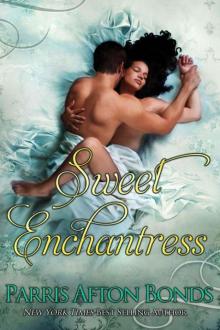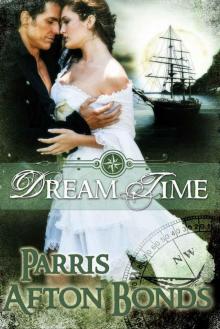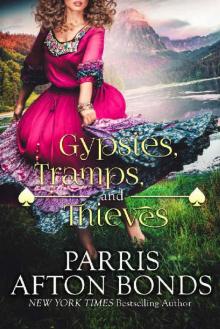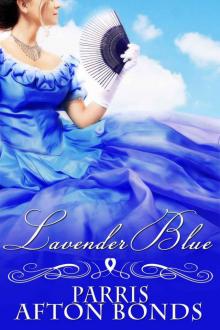- Home
- Parris Afton Bonds
Dream Time (historical): Book I Page 2
Dream Time (historical): Book I Read online
Page 2
Carriages and sedan chairs passed along Clarges Street. In the late afternoon shadows of fine old homes gone shabby, vendors selling homemade pies, hot roasted potatoes, and roasted chestnuts piped out their songs of sale.
Miles Randolph had requested that Nan meet him at 31 Clarges Street. Mercury’s winged feet could not have arrived at that destination any faster. She was curious about the place he had picked for their tryst. Alighting from the hackney, she stared up at the modest two-story building, one of the many residences elbowing for space on the street. Although a certain air of neglect pervaded the facades, one could discern tracings of former stateliness in the solid construction.
Then she saw Miles descend from a splendid barouche coach drawn by six horses. His back was as straight as a guardsman’s. A carnation was stuck in the buttonhole of his lapel, yet his cravat had been indolently knotted.
She watched him withdraw his gold watch and check the time. Then, as he tucked it back into his waistcoat, he caught sight of her and smiled. “I wondered if you had second thoughts about the propriety of my proposal.”
In her flat heels, she was much shorter than he, although he was only of medium height. “I am not influenced by propriety or the opinion of others, Mr. Randolph.”
“I had hoped you would take mine into consideration.” Lightly, he grasped her elbow to guide her toward the house behind him. At his touch, her blood sang out. Human touch for the last ten years, since her mother’s death, was foreign to her. Human touch was something she didn’t know she had missed—no, needed, desperately needed— until this moment.
“And your opinion is?” she asked, the four words costing all her breath.
“My opinion is that you are one of the very few females I have met who have not bored me to distraction.”
Her gaze flew to his face. She could scarcely believe that, at last, here was a man who appreciated her talents. In those dark marine-blue eyes she found no mockery. She was at a loss for a reply. Words that her lips were beginning to frame rang trite in her mind, and she swallowed them back.
Miles withdrew the key to the house, inserted it in the lock, opened the door, and stood aside for her to enter. Inside, the furniture was draped in dustcovers.
His expression solicitous, he detained her with a hand on her elbow. “There will be talk?”
That he should be concerned thrilled her. “The wagging tongues of neighbors would not bother me. My father, however, presents a problem. He’s a rector.”
“Ahh, and you depend upon him?”
With a grimace, she said, “My income as a playwright is valued in monetary terms of crowns not guineas. So I must keep house for him if I expect to have shelter from the storms.”
Miles cocked his head. “There may be something we can do about that.”
The remark puzzled her, but then he took her hand and gently tugged away the glove to press her palm against his lips.
“Your pulse thuds in your wrist. I frighten you?”
“You startled me, that’s all.” Her voice was calm, her manner poised, but surely he could hear her heart galloping; surely, he could see the fires of pure passion blazing in her eyes.
He grinned, and the hollows beneath cheekbones that were precipitous ridges softened. “From what I am told, you are fearless. You would have had to be to tackle Pitt for trebling the taxes on windows, carriages, and servants. Or your battle against the lord mayor. ‘I fight not with sword but with pen for a revolutionary social and political issue, the reform of Newgate’s inhumane treatment of its prisoners.’ Isn’t that what you wrote in the pamphlet An Enquiry into Reform?”
She was amazed. The article was an inconsequential piece dashed off several years before in a moment of anger, with limited distribution by the London Letters Club. “I am flattered you are aware of my works,” she replied lamely. She wondered what had happened to her gift of eloquence.
He took hold of her shoulders and turned her toward him. His voice was husky. “Let your heart and body be as courageous as your mind, Nan.”
That she could excite him like this was in itself an aphrodisiac to her. He began kissing the inside of her elbow, her neck, and she tilted her head back, affording his scalding kisses the arch of her throat. When he lifted her in his arms and carried her to the sofa, she made no protest. Instead, her hand clasped the back of his neck and drew his head down.
Hungrily, her lips sought his. Exquisite little spasms traveled through her muscles, beginning with her legs and moving upward and outward. She caught her breath. Then her words tumbled out in a murmur. “I didn’t know. I didn’t know.”
“There is more, I assure you, that you will find even more pleasurable.” Faint amusement warmed his voice.
He was right. His hand slid up past her knee garter and pink stocking, which had made her leg appear to blush for total lack of petticoats. When his hand encountered the bare flesh of her inner thigh, she gasped.
Instinctively, her legs closed. “No,” he whispered against her temple, “you are closing yourself off to the greatest glory of being a woman.”
As his fingers pried further, she acquiesced to the splendor of the sensations churning upward from the apex of her thighs. Her breathing was as heavy and ragged as his.
Of their own volition, her fingers fumbled for the brass buttons of his tight pantaloons. Having never dressed, or undressed man or boy, she was unfamiliar with the process.
He guided her. He pressed her down onto the sofa. Its dustcover conspired to tug her dress above her hips, baring her lower torso. He rolled atop her. His weight! It felt so different—and so wonderful.
Then she felt his hard flesh rubbing against her abdomen. Excitement raced through her. A maelstrom of lust overrode all else. Her legs spread eagerly to accept him. She barely felt the tearing of her maidenhood, so explosive was his invasion of her, so filling. A rushing, full feeling. Silly, she thought, that she should see orange and purple images moving fluidly over the backs of her lids.
After that, not another thought came. Because she had left her body. Or, at least, she would later believe she must have done so. In that time span of his taking her, and her giving herself, there was only the thrust and the arching of their bodies in tempo.
A seizure rippled through her. A small cry erupted from deep in her throat. She heard, as if from afar, his deep groan. Then, moments later, he was gathering her against him. Dazed, she lay languidly in his arms for some time. The emptiness that had gnawed at her for years and years was, at last, assuaged.
“You see, my bluestocking,” he said, nipping her earlobe, “there is more to life than the pursuit of knowledge.”
Laughter enriched her words. “I thought that was what I was pursuing. Carnal knowledge, that is.” The fact that she could joke amazed her. She had always considered herself humorless.
“This would be an excellent room to receive your literary friends, don’t you think?”
Puzzled by the remark, she turned in his arms. “What do you mean?”
His mouth found hers and stilled it. Weakness that she had belittled in other females eddied throughout her. She clung to his shoulders. Her maiden’s inexperience was completely overwhelmed by the force of her newly discovered passions.
At last he released her. “This place is yours.” Feeling bliss from sheer delight of being in love, she glanced around and looked up at him again. “Whatever are you talking about, Miles?”
“I have a small income from a rental place in the Shires. Between that and your wages for writing political propaganda, we’ll—”
Her brow furrowed. “I don’t write political propaganda.”
She knew a few who did. Political hacks. Their values and principles were liquid, to be molded by whomever was willing to buy their expertise with the written word. Their skill was in demand by a public that was limited but intensely and intelligently political.
“You do now.” His pleased expression captured her heart. “I have made certain contacts
and arranged for you to write for Fox himself.”
She frowned. “I don’t know, Miles. I’ve never—” His light kisses stilled her lips. “Nan, Nan. It’s the only thing I could come up with. It’s only for a little while. If Fox should be elected in place of Pitt, then my financial circumstances will vastly improve. Then we can make more permanent plans. Here, at least, we can be together. I’ve already signed the papers on this house.”
He took her by the shoulders and turned her to face the fireplace, with her back to him, his arms around her waist. “It is there we shall make love again. Within the week. No more hurried rendezvous like today.”
All doubt was banished by his words—and his kisses dropped softly, tantalizingly, on her collarbone and upper chest.
He had to take his leave soon thereafter but made arrangements to meet her there on Friday. “You are certain your father will not stand in your way of moving here?”
She laughed shortly. “I am an embarrassment to him, Miles. For him, it will be good riddance.”
He gave her some tracts of writing and kissed her good-bye. “This will give you an idea of what Fox is interested in. Mainly any issues that are in opposition to those of Pitt, but especially we want to champion the French reform measures.”
She certainly felt there was some merit to the last and was deliriously happy that she could be sharing in a part of Miles’s life.
Madness! Sheer madness, what she was about to do—to become the mistress of one of England’s most prominent politicians and eligible bachelors!
When she packed her belongings in a portmanteau and left her father’s house, he would not even tell her good-bye. He huddled over the remains of a fire, absently poking at the dying embers. In their flickering glow, he looked like a toothless old lion. Harmless. How had she imbued him with so much threatening power?
Sadly, she stared at the stooped shoulders he turned toward her. She crossed to him and dropped a kiss on the top of his head. There was little love between her and her father, but he was all she had.
No, that wasn’t true. She had Miles. That very night she lay in his arms and stared up at the four-poster’s draperies. Miles nuzzled her neck. “What are you thinking, my bluestocking?”
She turned in to his embrace. “How very, very happy I am.”
“Then you don’t regret this arrangement?”
“I wouldn’t regret this for all the tea in the East India Company’s warehouse.”
Her boldness surprised even herself. The prudish, sexless Nan Briscoll was no more. For the first time, Nan Briscoll was wildly, deliriously, recklessly in love.
Miles Randolph neither drank excessively, nor used snuff or smoked tobacco from one of those obnoxiously long churchwarden pipes. Neither did he frequent the gambling tables. The only time Nan saw him wager was at the Newmarket horse races on a horse of Barb blood introduced by Godolphin more than a half century earlier.
Miles’s innovative mind continually provided pastimes that would amuse her—a visit to a bowling green, which reminded her of a great billiard table; to a cockfight, where scandalous women bid as raucously as the men.
That she no longer received invitations to dinner parties and levees bothered her little. She was content in that charming old house on Clarges Street. Occasionally, when with Miles, she would run into an old friend—Coleridge, Lady Albemarle, or Romney. They were invariably cordial and circumspect, uttering nothing that would betray any censure of her new position as Miles’s mistress. After all, wasn’t Lord Nelson’s mistress, Lady Hamilton, well received?
When Nan wasn’t with Miles, she wrote. He glanced over her pamphlets and newspaper articles, made a few suggestions, then submitted the articles to Fox. The thrusts of her articles grew more staunchly pro-French and Jacobinic as the weeks went by. That she was courting Pitt’s displeasure bothered her little. Miles’s love for her made her invincible.
Then one evening, Miles didn’t come home. That night, as she paced and worried for his safety, she began to fear the worst. What if he had been set upon by footpads?
Restless, her stomach in knots, she would cross time and again to the window, peer out into the darkness, and retrace her steps across the inlaid mahogany floor.
That Miles might be dead was the most horrible thought she could envision.
Or so she thought.
A pale Romney knocked upon her door later that morning to bring her the news that Miles had fled England for France. “My dear,” he said, twisting his cocked hat between his slender artist’s hands, “I fear that Miles Randolph has been working as a French agent.”
“What?” Her hand went to her chest, and she would have staggered had it not been for the support of the door.
“I’m afraid I bring far worse news than that.”
What could be worse? She stared at him uncomprehendingly.
He took a deep breath and plunged on. “In letting your heart rule your head and rashly defending Jacobinism, you have been implicated with Miles. I come just ahead of the bailiff. You are to be charged with treason.”
§ CHAPTER THREE §
Newgate prison was a nightmare of surrealistic proportions. To think she had written an article denouncing the institution from an impersonal point of view!
Almost a hundred female prisoners were incarcerated in Newgate, and they were not separated from the male prisoners. For a woman of genteel birth to survive with all her faculties intact would be considered a minor miracle.
Between her physical pain and her emotional pain, Nan Briscoll easily distinguished the greater. Her body was resolute, but she was unprepared for the loss of love.
However wretched were the conditions in the prison, and they were incredibly wretched, her thin body was sustained by her inner resources and resilience.
She was imprisoned in the worst part of the prison—Commonside. It was so crowded with pickpockets, felons, ruffians, and murderers as to justify its title of Hell on Earth.
Coleridge was appalled. “My dear girl, when I heard about your circumstances, I came as soon as I could. Is there anything I can do to alleviate your ... conditions here?"
Yes, she thought dully, kill me. Kill me so I no longer have to think, to feel. “No.” Her reply was a mere whisper.
His bulbous nose wrinkled in response to the fetid smell. He glanced at the sordid women around him. His fingers polished the malachite handle of his cane. He cleared his throat. “Honestly, I think there is not much anyone can do about your legal situation, Nan. With a charge of treason being prepared against you, you will be lucky if you aren’t sentenced to hang.”
That she did not appear to be listening disconcerted him, and he started over. “I have some influence, very little actually, with certain Parliament members. Maybe a word here or there about obtaining a more favorable sentence—at the least, obtaining a grant of the Privilege of the Rules for you.”
Those prisoners who had abundant financial resources could resort to the Privilege of the Rules. This meant paying for the right to reside in lodgings outside the prison walls but close enough to report back daily.
“Of course, we’ll need to find some financial backing for this, but...” He paused.
She bestirred herself to reply. “No. No, I wish to be hanged, Coleridge. Hanged quickly. Do you understand?”
With the other women screeching like harpies, he grew agitated. “You are distraught. You don’t know what you are saying. I’ll return as soon as I know more.”
Within a few seconds, she could hear his buckled slippers tap-tapping down the cold stone corridor with a rapidity that did credit to a man of his girth and age.
She returned her mind to its own padded cell, where thought and feeling could not intrude. Little by little the slender shafts of sunlight from barred windows high overhead climbed the floor and walls to escape through the seams of the ceiling.
In the overcrowded prison, she found a space to stretch out for another night. Each prisoner was allocated floor spac
e eighteen inches wide by six feet long. Those lucky enough slept in hammocks strung from one wall to a great oak pillar in the room’s center.
The first night, she had worried about being molested by one of the male prisoners. Either they were as apathetic as she or they simply weren’t interested in her. Not yet, anyway.
What she did not worry about was jail fever. The lack of ventilation and sanitation killed the prisoners off like flies. She could only hope she could be so fortunate as to catch the fever.
Sleep, of course, did not come. If the noise didn’t keep her awake, the vermin did.
After nearly ten days of languishing in Newgate, Nan was taken to an antechamber to bathe in vinegar. By now, she had heard enough to know that this was a signal she was to be taken into court. The vinegar bath was a preliminary precaution against a prisoner’s stench and transmission of jail fever to the judge, counsel, jury, and warders.
She was finally having a trial—but without even a barrister to represent her?
Along with several other prisoners, political ones from Fleet Street Prison, she was herded not into Old Bailey, the central criminal court of London, but into Westminster Hall. Alone, she was hauled before the Bar of the Court of King's Bench.
The enormous number of people who crowded the paneled room to watch was amazing. They stared at her in particular. She realized she appeared unkempt, haggard even. Her pride burned.
Then she understood why she was the source of attention. The white-wigged attorney general, appearing for the Crown, rose to give his opening remarks. “We have before us a woman who the Crown will prove is a support of the foolish doctrine of equality and who seeks to unleash terror like that instigated by the revolutionaries of France.”
She was being tried for high treason by the supreme criminal court of the realm!
The spectators broke out in mutterings that sounded as if the room were filled with swarms of bees. Majority opinion in England was still opposed to reform. The bloodbath of horror attendant upon the French Revolution was enough to make a proper Englishman tremble in outrage.

 Renegade Man
Renegade Man Sweet Enchantress
Sweet Enchantress Savage Enchantment
Savage Enchantment Mood Indigo
Mood Indigo Indian Affairs (historical romance)
Indian Affairs (historical romance) AT FIRST SIGHT: A Novella
AT FIRST SIGHT: A Novella The Maidenhead
The Maidenhead Dream Time (historical): Book I
Dream Time (historical): Book I Made For Each Other
Made For Each Other GYPSIES, TRAMPS, AND THIEVES
GYPSIES, TRAMPS, AND THIEVES Deep Purple
Deep Purple Tame the Wildest Heart
Tame the Wildest Heart LAVENDER BLUE (historical romance)
LAVENDER BLUE (historical romance)